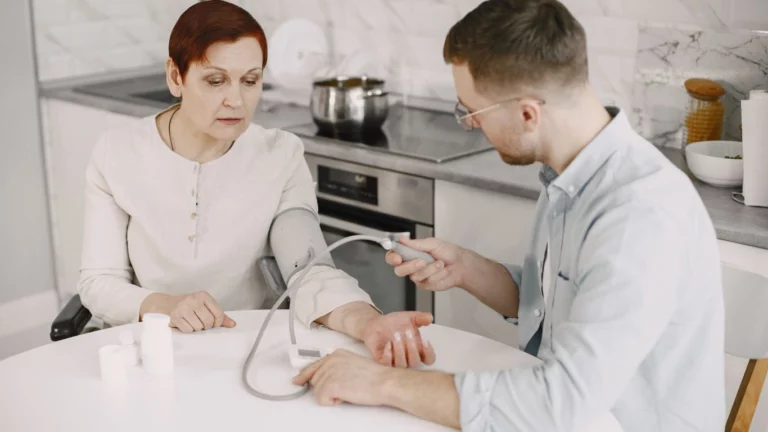How to Support a Loved One with Hypertension: Effective Strategies for Success
Hypertension is a common condition that affects millions of people worldwide, and its impact extends beyond just the individual diagnosed. As an Internal Medicine Physician specializing in Hypertension Management, I’ve seen firsthand how crucial it is to support a loved one living with high blood pressure. The emotional and physical toll of managing hypertension can be overwhelming, and many people don’t fully understand how to best support their loved ones through it. This article aims to provide insights on how to support a loved one with hypertension, offering practical advice and emotional guidance to help them feel empowered, heard, and loved. If you’re wondering what you can do to help, you’re in the right place.
Understanding Hypertension: Why It Matters

Before we dive into the ways you can support your loved one, it’s important to first understand what hypertension is and why it matters. Hypertension, also known as high blood pressure, occurs when the force of blood against the walls of the arteries is consistently too high. This can lead to serious health problems like heart disease, kidney failure, and strokes. It’s called the “silent killer” because many people don’t experience symptoms until the damage is already done.
Having a loved one with hypertension can be difficult. As a family member or friend, it’s natural to want to help, but you might not always know how. Understanding the condition is the first step in providing the right kind of support. And trust me, your support can make a world of difference in their treatment journey.
Recognizing the Emotional Challenges of Hypertension

Managing hypertension isn’t just about popping pills or keeping an eye on blood pressure readings. It’s also about the mental and emotional toll it takes. When someone you love has hypertension, you may notice that they seem more stressed, anxious, or even frustrated. They may feel overwhelmed by doctor’s appointments, medication regimens, or the constant reminder that they need to be careful with what they eat or how much they exercise. These emotional challenges can sometimes be more exhausting than the physical symptoms themselves.
As a medical professional, I’ve witnessed the emotional strain that hypertension places on individuals. The fear of complications, the worry about what might happen next, and the pressure to make lifestyle changes all contribute to heightened stress levels. That’s why emotional support is just as important as physical support when it comes to helping a loved one manage hypertension.
How to Support a Loved One with Hypertension: Practical Tips

Now, let’s get into the practical ways you can provide support to someone living with hypertension. These tips are designed to empower both you and your loved one, making it easier to manage the condition together and improve their quality of life.
1. Educate Yourself About Hypertension
One of the first steps you can take to help your loved one is to educate yourself about hypertension. The more you know about the condition, the better equipped you’ll be to support them. Understand the basics—what hypertension is, how it affects the body, and why it’s important to keep blood pressure under control.
Additionally, keep up with the latest research and recommendations about managing hypertension. This will not only help you provide better advice but also keep you informed when it comes to discussing treatment options with their healthcare provider. I’ve always found that patients and their families feel more empowered when they are knowledgeable and have a solid understanding of what’s happening with their health.
2. Encourage Healthy Lifestyle Changes
Hypertension management often involves lifestyle changes, and as a supportive loved one, you can play an essential role in making these changes easier. Some of the key lifestyle changes that can help manage hypertension include:
- Eating a balanced diet: A diet rich in fruits, vegetables, whole grains, and lean proteins is crucial. Reducing salt intake is also important in lowering blood pressure.
- Exercising regularly: Regular physical activity—at least 30 minutes a day—can significantly lower blood pressure.
- Managing stress: High levels of stress can raise blood pressure, so finding ways to relax, such as meditation, deep breathing, or even spending time in nature, is important.
- Limiting alcohol and caffeine: Both of these can contribute to higher blood pressure if consumed excessively.
Encouraging these changes in a positive, non-judgmental way is key. Rather than making your loved one feel like they’re being scolded, try to offer support and make changes together. For instance, you could suggest going on walks together or trying out new healthy recipes. Making it a joint effort can help them feel less isolated in their journey.
3. Be There for Their Doctor Visits
Accompanying your loved one to their doctor appointments can be incredibly helpful. Sometimes, people with hypertension feel nervous or overwhelmed when meeting with their healthcare provider, and having a supportive person by their side can ease those feelings. You can take notes, ask questions, and help them remember the doctor’s advice. I often recommend bringing a family member or close friend along, as it provides both emotional and practical support.
Additionally, if you’re there in person, you can also act as an advocate. If your loved one is feeling uncertain about a treatment plan or if they forget something important, you can gently remind them to ask questions or bring up concerns that they might have. It’s all about working together as a team.
Offering Emotional Support: A Key to Managing Hypertension

As we’ve already discussed, hypertension is not just about physical health; it also has a huge emotional component. As a healthcare provider, I can tell you that the emotional aspect of managing hypertension can often be underestimated. But let’s face it—stress and anxiety can wreak havoc on a person’s blood pressure. That’s why emotional support is crucial for those with high blood pressure. But how can you offer this support effectively?
One of the most important things you can do is be an empathetic listener. Often, your loved one may not need advice right away, but rather a safe space to talk about their feelings, fears, and frustrations. Just being there, without judgment or pressure, can make all the difference. Listen to their concerns and acknowledge their emotions—this can help them feel validated and less alone in their struggle.
Another important factor is reducing the emotional stress in their environment. If your loved one feels constantly overwhelmed by their responsibilities or anxious about the future, it can be harder for them to manage their hypertension. Encourage them to take breaks, relax, and practice mindfulness or meditation. In some cases, even engaging in small, enjoyable activities like watching a favorite show or going for a leisurely walk can provide much-needed stress relief. Remember, reducing stress in everyday life is just as important as taking medications or making dietary changes.
4. Help Them Stay On Track with Medication
Managing medication is another area where your support can make a real difference. Hypertension treatment often involves taking daily medications to lower blood pressure, but staying consistent with this regimen can be challenging. As a doctor, I’ve seen how easy it is for patients to forget to take their medications, especially when they’re feeling well and their blood pressure is under control. But that’s the tricky part—hypertension often doesn’t show obvious symptoms, so it’s easy to become complacent.
One way you can support your loved one is by helping them create a medication schedule. Set reminders for them, either through a phone app or with physical notes in visible places. Some people find that using a pill organizer is a great way to stay on top of their daily doses. If they struggle with taking medications due to side effects or other concerns, be proactive and offer to talk with their healthcare provider to discuss possible alternatives or solutions.
5. Foster a Healthy Social Support System

Social support is another vital aspect of hypertension management. Feeling isolated can add to the stress of managing any chronic illness, and hypertension is no exception. Encourage your loved one to stay socially connected, whether it’s with friends, family, or support groups. If they feel comfortable, help them find an online or in-person support group where they can share their experiences with others facing similar challenges. There’s something deeply comforting about knowing that you’re not alone in your struggles, and it can be incredibly empowering.
If your loved one is hesitant to reach out for help, don’t push too hard, but gently remind them that support is there for them if they want it. You can also take it upon yourself to create a circle of support by inviting friends or family over for meals, organizing small get-togethers, or encouraging them to join activities that keep them engaged socially. When a person feels loved, heard, and cared for, it goes a long way in their overall well-being, both physically and emotionally.
6. Encourage Regular Blood Pressure Monitoring
One of the most important aspects of managing hypertension is keeping track of blood pressure regularly. While visits to the doctor are essential, monitoring at home can also help catch any spikes or drops early on. If your loved one is not already keeping track of their blood pressure, this is a great way you can help them stay on top of their condition.
Encourage them to use a blood pressure cuff at home (which is easy to use and affordable) and keep a log of their readings. You can even offer to help them with this task. If they are unsure about how to properly monitor their blood pressure, a quick tutorial from a healthcare provider or even a YouTube video can be helpful. This small but significant act can give them a sense of control over their health and provide important data for their doctor to adjust treatments if necessary.
7. Offer Help with Day-to-Day Tasks

Sometimes, managing a chronic condition like hypertension can be exhausting, and your loved one may find it difficult to handle day-to-day tasks. Whether it’s preparing healthy meals, getting to doctor appointments, or just managing household responsibilities, your help can take a huge burden off their shoulders.
Offer to help with tasks that may feel overwhelming. For example, you could cook meals together or take turns preparing healthy options. If they need a ride to a doctor’s appointment, offer to drive them or accompany them for support. Helping out with chores, childcare, or errands can give them more time and energy to focus on their health and well-being. By doing this, you’ll show them that you’re there for the long haul, and that their health is your priority.
8. Celebrate Small Wins
Hypertension management isn’t an all-or-nothing journey. It’s a series of small steps that add up over time. That’s why it’s essential to celebrate the little victories along the way. Whether it’s lowering their blood pressure by a few points, sticking to a new exercise routine for a week, or making better food choices, these wins should be acknowledged and celebrated. Positive reinforcement can motivate them to continue making progress.
Don’t wait for the big milestones—celebrate the smaller ones too! Acknowledge the effort they’re putting in and remind them how far they’ve come. Whether it’s a congratulatory text or a small treat, showing appreciation for their hard work can help them stay motivated. Plus, it strengthens the bond between you as you navigate the ups and downs of managing hypertension together.
Understanding the Long-Term Impact of Hypertension

When it comes to hypertension, it’s easy to focus on the immediate actions that can be taken—lowering blood pressure, taking medication, and making lifestyle changes. But what about the long-term impact? How can you help your loved one understand and prepare for the road ahead? This is an important aspect of managing hypertension, and it’s crucial for both patients and their loved ones to take a holistic view of the situation.
As a healthcare provider, I’ve seen that long-term hypertension can lead to complications such as heart disease, stroke, kidney failure, and even vision loss if it’s not properly managed. The good news is that with consistent care and a proactive approach, these risks can be minimized. But to achieve that, it’s important to be aware of the potential challenges that lie ahead, which is where you come in as a supportive family member or friend.
One of the best things you can do is help your loved one stay focused on their health in the long run. Regular check-ups, consistent blood pressure monitoring, and ongoing lifestyle improvements are all essential for managing hypertension over time. Encourage them to stay engaged with their healthcare team and to take an active role in managing their condition.
9. Be Patient and Avoid Negative Reinforcement
One of the most challenging aspects of supporting someone with hypertension is learning to be patient. Managing a chronic condition like high blood pressure can be frustrating, and it often doesn’t show immediate results. I can’t stress enough how important it is to avoid negative reinforcement. Harping on them about missed medications or diet slip-ups can add stress, which is counterproductive to their well-being.
Instead, focus on encouragement. Positive reinforcement goes a long way in helping someone stick to their treatment plan. Small, consistent progress should be acknowledged, even if they aren’t seeing immediate changes in their blood pressure readings. These kinds of positive actions foster trust and motivation. I’ve seen many patients thrive when they’re not constantly reminded of their setbacks but are instead celebrated for their commitment to improvement.
10. Understand the Importance of Regular Follow-Ups

Hypertension isn’t something that can be managed once and forgotten about. It’s a lifelong journey, which is why regular follow-ups with their doctor are so important. I’ve worked with patients who, after months of good results, start to feel like they no longer need to check in with their healthcare provider. But the reality is that hypertension needs ongoing management and monitoring to avoid complications.
Remind your loved one about the importance of these follow-up visits, and if possible, accompany them. It can be hard to keep track of everything a doctor says in a single appointment, so having someone there to take notes or ask questions on their behalf can be incredibly helpful. The more engaged both you and your loved one are with their healthcare team, the more likely they are to stay on top of their hypertension management.
11. Be a Role Model for Healthy Habits
Sometimes, the best way to support a loved one with hypertension is to lead by example. Adopting healthy habits yourself can not only benefit your own health but also create a supportive environment for them. When both of you make health a priority, it becomes easier for your loved one to stick with their goals. For instance, if you both start cooking healthier meals together, or if you commit to exercising regularly, they may feel more motivated to do the same.
Leading by example doesn’t just mean encouraging them to eat better or exercise more—it also means showing them how to handle stress, get enough sleep, and prioritize mental health. All of these elements work together to help lower blood pressure. By integrating these habits into your daily life, you can provide your loved one with the support they need to stay on track while also improving your own well-being.
12. Encourage Mental Health and Wellness
While physical health is important, mental health plays an equally significant role in managing hypertension. Stress, anxiety, and depression can all contribute to higher blood pressure, so it’s essential to help your loved one find ways to manage their mental health. Activities such as yoga, meditation, and even creative outlets like painting or journaling can be incredibly effective at reducing stress.
Additionally, if your loved one is experiencing more serious mental health struggles like depression or anxiety, encourage them to seek professional help. Sometimes, managing a chronic health condition like hypertension can trigger mental health challenges, and it’s important not to ignore them. You can be an important advocate for their mental health by providing encouragement and offering resources when needed.
13. The Power of Patience: Managing Setbacks
No journey toward better health is a straight line. There will be ups and downs, especially with a condition like hypertension. Even if your loved one is doing everything right—eating well, exercising, taking medications regularly—there may still be moments when their blood pressure readings aren’t where they should be. These setbacks can be disheartening, and it’s easy to feel like all the effort isn’t paying off.
During these times, remind your loved one that managing hypertension is a long-term process. There may be adjustments to their medication, changes to their diet, or even new treatments to try. What’s most important is that they don’t give up. Let them know that setbacks are normal, and encourage them to stay committed to their health journey. Remind them that the road to better health is rarely a straight path, but that doesn’t mean progress isn’t happening.
References
- National Institutes of Health
- Health.com
- Centers for Disease Control and Prevention
- American Heart Association
Disclaimer
The information in this article is for informational purposes only and should not be considered medical advice. Always consult with a qualified healthcare provider for any concerns regarding your health or the health of a loved one. The author, as an Internal Medicine Physician, shares this information based on personal experience and general medical knowledge. Individual health needs vary, and treatments should always be personalized to fit the specific circumstances of the patient.

Dr. Gwenna Aazee is a board-certified Internal Medicine Physician with a special focus on hypertension management, chronic disease prevention, and patient education. With years of experience in both clinical practice and medical writing, she’s passionate about turning evidence-based medicine into accessible, actionable advice. Through her work at Healthusias.com, Dr. Aazee empowers readers to take charge of their health with confidence and clarity. Off the clock, she enjoys deep dives into nutrition research, long walks with her rescue pup, and simplifying medical jargon one article at a time.







